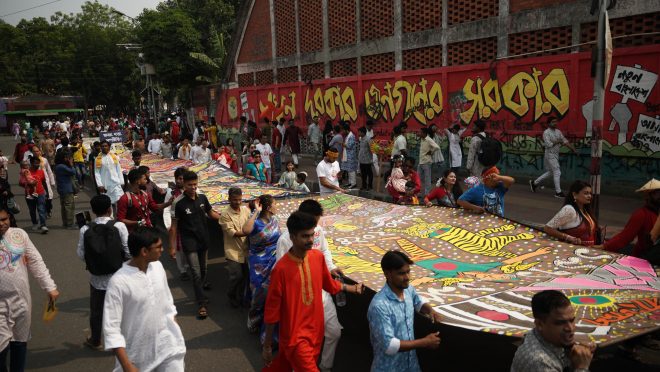The changing face of Pahela Baishakh celebrations
The changing face of Pahela Baishakh celebrations

Pahela Baishakh, the first day of the Bangla calender, is one of the biggest celebrations for our Bangali culture.
It was first introduced during the Mughal rule, and it was a day to collect khajna (tax) from farmers and businesses opened their new accounts book on this day. Still, to this day, many businesses open their new account book on 14 April.
Pahela Boishakh starts from the dawn of 14 April with celebrations such as processions, fairs, musical and dance performances and other cultural events.
For me, Pahela Baishakh was about fairs or “Baishakhi Mela” that brought with it joy and an air of festivity. It was common to see colourful fairs in unused lands of all localities even a few years back. Different types of handmade terracotta items, clay potteries and toys were sold in the Baishakhi melas. Other than clay, wooden items such as flutes, “Ektara”, “Dhol”, were also found in these fairs since these musical instruments route back to our Pahela Baishakh history.
Different fabrics and clothes were also sold in those melas as well as unique jewelry and other plastic toys for children like water guns, plastic balls and even flutes. The snacks stalls in those fairs were my favourite part. You could find all types of sweet, savory and spicy items such as ‘Batasha’, ‘Nimki’, and ‘Moa’. Most of these food items weren’t even sold in package form, rather given in a simple paper bag or polythene as some weren’t made in the factories but by the sellers themselves.
That was not all. Baishakhi Mela often had entertainment opportunities such as ferris wheel, bioscope, puppet shows and even snake dances. There were other games available for children like balloon shooting and darts games.
However, did you realise how the celebrations around Pahela Baishakh are slowly changing? Now fairs are being replaced with concerts or other festivities. People either like to spend it at home or going to restaurants to meet with loved ones.
The fairs or festivities we experienced are unknown to the children of this generation. They treat Pahela Baishakh as a regular holiday and never understood the significance of it.
Maybe some of them are aware of the traditions of “Panta Ilish” but there is more to it than that. These fairs, which were an integral part of the celebrations, are non-existent these days. Schools do host fairs for children, but they are completely different from the actual fairs; they cannot replicate the vibes and feelings.
In a way, it is our fault that we couldn’t preserve the traditions of Pahela Baishakh for the younger generations.
We have to make sure that today’s generation knows the history and the culture of Pahela Baishakh so they can realise its significance for the Bangalis and celebrate the day to the fullest.


